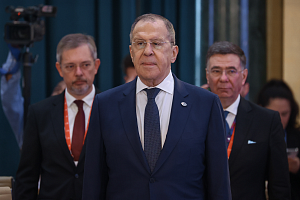Foreign Minister Sergey Lavrov’s remarks at the plenary session of the G20 Foreign Ministers’ Meeting on countering terrorism, digital transformation, humanitarian assistance and disaster risk reduction, New Delhi, March 2, 2023
Colleagues,
The global economy currently finds itself at the nexus of several major challenges. Many of them are geopolitical in nature or are exacerbated by international confrontation. In particular, this concerns the pressing topics on the agenda of the Indian Presidency: terrorism, drug trafficking and natural disasters. It is up to the corresponding frameworks, primarily, in the UN, to come up with the appropriate responses to these dangerous developments.
The surge in terrorism has been largely attributable to Western interference in the domestic affairs of sovereign states. Iraq, Libya, Syria and Afghanistan suffered from armed ventures and neo-colonial aspirations, which undermined their statehood, with terrorist groups on the loose, the growing threat of drug trafficking, impoverishment of the people and the deterioration of human rights. The total lack of progress on settling the Palestinian issue also contributes to the dangerous instability in the Middle East.
Libya’s destruction greatly inflated the terrorist threat in Africa, especially in the Sahara and Sahel region.
Since 2014, a new and ever-growing hotbed of extremism has emerged in Ukraine. There is an unrestrained effort to supply more and more weapons to the Kiev regime, while openly supporting nationalist battalions all covered in Nazi emblems and tattoos from head to toe. An effort to recruit mercenaries from NATO countries, as well as among international terrorists, is underway. There is evidence of lethal weapons being smuggled out of Ukraine to other hotspots around the world.
Today, we have already mentioned the Nord Stream explosions, which was an act of sabotage within NATO’s area of responsibility off the EU coast. It is quite telling that this terror attack took place soon after a joint military exercise by a NATO coalition involving the US Navy. We insist on holding an open and impartial investigation, including on carefully examining information on the involvement of government agencies from the United States and other Western countries.
The West seeks to shatter the unity of the global counter-terrorism front. Hostile actions to limit Russia’s rights within FATF are the latest example of these efforts, which in essence amount to encouraging international terrorism. We are convinced that renouncing double standards and hidden agendas is critical for responding to the terrorist threat. Efforts to eradicate this absolute evil cannot be made hostage to momentary considerations and bloc-based approaches.
Russia immediately provided relief and humanitarian aid to Türkiye and Syria following the recent destructive earthquakes. Over the past years, Russia helped more than 110 countries, primarily in Africa, the Middle East and Latin America, to overcome natural disasters. We also provided over $270 million to international humanitarian structures to this effect.
The rapid development of ICT and the accelerating pace of digital transformation create substantial risks. Russia was the first country to suggest drafting an international convention on fighting cybercrime within the UN. In 2019, Russia initiated and co-sponsored with 47 other countries a UN General Assembly resolution to launch the relevant negotiating process, which is now entering a practical phase. We proceed from the premise that the draft convention will be submitted to the UN General Assembly during its 78th session.
Speaking about the UN, Russia reaffirms its commitment to reforming the Security Council by expanding the representation of developing countries. For many years now, we have been supporting Brazil’s and India’s bids to join it, while also making sure that we satisfy the interests of the African continent. As for the West and its allies, they currently account for six out of 15 seats on the Security Council. There is no doubt that this is more than enough.
Overall, it is clear that the new geopolitical reality has become a test for all multilateral institutions. This relates to the United Nations, as well as the Group of Twenty. Those that manage to emerge as platforms capable of balancing the interests of states instead of simply justifying someone’s claims to hegemony will stay relevant.


